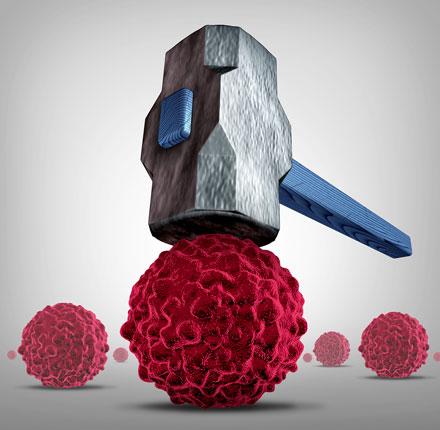You are here
Immunotherapy ‘future of cancer treatment’, oncologists say
By Mohammad Ghazal - Oct 15,2016 - Last updated at Oct 15,2016

Sana Al Sukhun, president of the Jordan Oncology Society, speaks at a workshop in Copenhagen on immunotherapy recently (Photo courtesy of Merck)
COPENHAGEN — Immunotherapy brings new hope to cancer patients in Jordan and has already saved many lives, but cost remains a challenge, according to oncologists and experts.
In Jordan, immunotherapy has already helped many patients by either prolonging their lives or stopping the cancer cells from spreading, according to Sana Al Sukhun, president of the Jordan Oncology Society.
Speaking at a recent workshop by Merck, a healthcare company also known as MSD, Sukhun said immunotherapy is the future of cancer treatment.
“It holds promise, and we in Jordan and the Arab world need to focus more on this type of treatment, which has fewer side effects than other types of treatment, such as chemotherapy,” Sukhun told The Jordan Times at the workshop, on the sidelines of the European Society for Medical Oncology 2016 annual congress in Denmark last week.
Immunotherapy is designed to boost the body’s natural defences to fight cancer.
It has already proven successful in the treatment of non-small cell lung cancers, metastatic melanoma, which is the deadliest form of skin cancer, and other types of cancers affecting the kidney, bladder, head and neck, the experts said during the workshop.
“Several patients in Jordan and the region have already undergone immunotherapy, and it has helped in prolonging their lives or stopping the cancer from spreading to other parts of the body,” Sukhun said, adding that immunotherapy trials showed that the treatment eradicated cancer cells.
The expert said the number of cancer patients in the Middle East is growing, calling on Arab health regulators to take action and engage in negotiations with pharmaceutical companies to help lower the cost for cancer patients.
“New medications that help stimulate the immune system to fight cancer cells are costly…To help make them more affordable, health regulators can engage in talks with manufacturers at a national level, which helps in bringing the prices down,” Sukhun said.
Immunotherapy medication was registered in Jordan recently after being approved by the Jordan Food and Drug Administration, she added.
Yasser Abd El Kader, professor of oncology at Cairo University, said 68-70 per cent of cancer cases and patients in the region are already in advanced stages when they are diagnosed.
He said 96 per cent of patients with lung cancer die, and that eight out of 10 lung cancer patients are smokers, stressing that immunotherapy revives hope in helping cancer patients.
“Immunotherapy has already been successful in helping many patients. It is giving hope to cancer patients, and we in the Arab world need to focus more on it… Regulators must work to make it cheaper for patients,” Abd El Kader agreed during the workshop.
“In the long-term, the cost will not be a challenge. Immunotherapy was just approved by international health regulators as a first-line treatment. We are currently in the process of [determining] who are the best patients to benefit from the treatment,” he added.
At a separate meeting on the sidelines of the congress, Roger Dansey, senior vice president of oncology late-stage development for Merck Research Laboratories, said approximately 14 million people are diagnosed with cancer every year and about 8 million die annually.
The number of cancer patients diagnosed annually is expected to rise to more than 20 million by 2030, he said, adding that the number of deaths from cancer is expected to exceed 13 million per year in the next two decades.
“Immunotherapy is certainly the future when it comes to treating cancer… The problem with any treatment that is not immune based is that cancer cells can find a way to circumvent whatever the treatment is,” Dansey told The Jordan Times.
During the congress, oncologists and experts said the registration process of new medications in the Middle East takes longer generally than in the West, which sometimes delays the arrival of new medications to the region.
More regional collaboration is needed in the exchange of research in the field of oncology, workshop participants said.
“Unfortunately, we in the Arab world rarely work together on research and there is no constant communication. We need to work more together in this field or we will lag behind the rest of the world,” Shouki Bazarbashi, from the King Faisal Specialist Hospital and Research Centre in Saudi Arabia, said during the event.
Arab oncologists need to cooperate to ensure that patients in the region have access to the new treatments, Bazarbashi added.
Related Articles
AMMAN — Cancer treatment using immunotherapy drugs is now available in Jordan after being approved by the concerned authorities, giving more
LOS ANGELES — Robert Waag is alive and apparently cancer free more than two years after advanced melanoma reached his lungs, hips and other
PARIS — A woman with an aggressive form of breast cancer which defied chemotherapy and spread to other organs, was cured with an experimenta


















